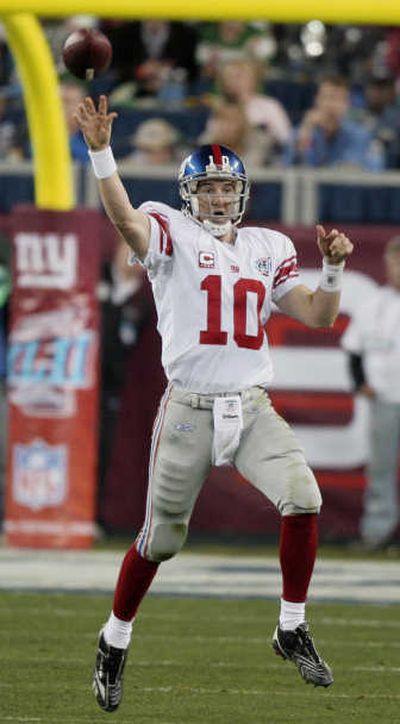Younger Manning comes of age

GLENDALE, Ariz. – The perfect team flailed. The unflappable quarterback flapped. The genius coach got outsmarted. And in the last minutes of Super Bowl XLII, in that frantic time for legends, Eli Manning became a hero.
You know. Just as everyone expected.
What’s there to say? Nothing made sense Sunday.
The New York Giants’ 17-14 victory over undefeated New England was more than just the most spectacular and inconceivable Super Bowl upset since Joe Namath ran off the field with his finger wagging. It was a walk through the funhouse. New England quarterback and matinee idol Tom Brady looked spooked. Patriots guru Bill Belichick seemed baffled. The highest-scoring offense in NFL history stopped and started and sputtered like an old lawnmower.
And, more than anything, Giants quarterback Eli Manning unleashed the Montana within. Was there anyone, anywhere, who thought that Manning – down four points, barely more than 2 minutes left, 83 yards to go against the team already called the greatest ever – had what it took to drive his team all the way? Did Eli believe it himself?
“Sure, that’s just where you want to be,” Manning would say. “You want to be down four points, so you have to score a touchdown. You want that.”
His first pass was to Amani Toomer, a quick one to the right side, 11 yards, a first down. That was a good pass, important, it settled everyone down. The question in New York for four years had been simple: Was Eli Manning tough enough? It wasn’t just that Eli was Peyton Manning’s little brother. He looked like a little brother, you know, a little cocky, a little mischievous, a little bit spoiled. He threw a lot of interceptions. He fumbled the ball when he got hit. How the heck was he going to hold up in the last minutes of the Super Bowl?
So, yes, that pass to Toomer was big, a confidence builder, not just for Eli but for everybody around. Hey, maybe the kid could do it. He threw an incomplete pass and then his next pass was soft, uncertain, and it was almost intercepted by New England’s Rodney Harrison. Maybe the kid couldn’t do it.
“We expected to get the stop,” Patriots linebacker Tedy Bruschi would say.
Of course they did. They were the Patriots. He was Eli Manning, just turned 27, New York’s boo target. On third down, Manning completed a 9-yard pass over the middle to Toomer. The clock ticked. Fourth down and 1. The Giants went for it of course. Ran up the middle for 2 yards. The drive was alive, but barely. Maybe the kid couldn’t do it.
Next play, Manning ran, and the ball was knocked out of his hands. Next pass, Manning ovethrew his receiver and threw it right to Patriots All-Pro cornerback Asante Samuel. It went through Samuel’s hands.
“I left the game on the field,” Samuel would say.
The kid was unraveling.
Then came the moment. Manning dropped back, and nobody was open. Suddenly, a team picture of the New England Patriots’ defensive line descended upon him. They grabbed him. The shoved him. They pushed him, pulled at him, it was as if one of those Hollywood scenes where some army of the undead tries to pull someone under.
“That play,” Giants defensive end Michael Strahan would say, “took years off my life.”
Only – and even now, even after seeing the play five times, six times, seven times, I still can’t explain it – Eli somehow escaped. It was a James Bond moment. He pulled away from the arms, stepped back, heaved the football down the field to a backup receiver named David Tyree who leaped up in the air, grabbed the ball, secured it against his helmet, and fell to the ground. The play covered 32 yards. It will be shown for as long as they put Roman numerals after Super Bowls.
“David just made an incredible play,” Manning would say.
“I have absolutely no idea how Eli got the ball to me,” Tyree would say.
And at that moment, suddenly, the impossible seemed inevitable. Manning completed a 12-yard pass to Steve Smith that gave the Giants the ball on the New England 13. And with 39 seconds left in the game, with the crowd stunned and thrilled, with the Patriots suddenly aware that, hey, they really and truly might lose, Manning dropped back. His best and loudest receiver, Plaxico Burress, faked as if he were going to run an inside slant route to his right. New England’s cornerback Ellis Hobbs believed him and headed that way.
Then Burress suddenly took off left, for the end zone, Hobbs stumbled. Burress was all alone. Eli lofted the easy pass. Burress caught it. The touchdown pass that beat the New England Patriots was so simple and so open, a child could have thrown it.
But a man threw it.
“Give all the credit in the world to Eli,” Tom Brady would say afterward.
They would all say that. You never know how someone will perform in the biggest moment, on the biggest stage, with the heaviest pressure on.
“In a lot of ways, we shocked ourselves,” Michael Strahan would say.
And Eli?
“Naw,” Strahan said with a big smile on his face. “We always believed in him.”